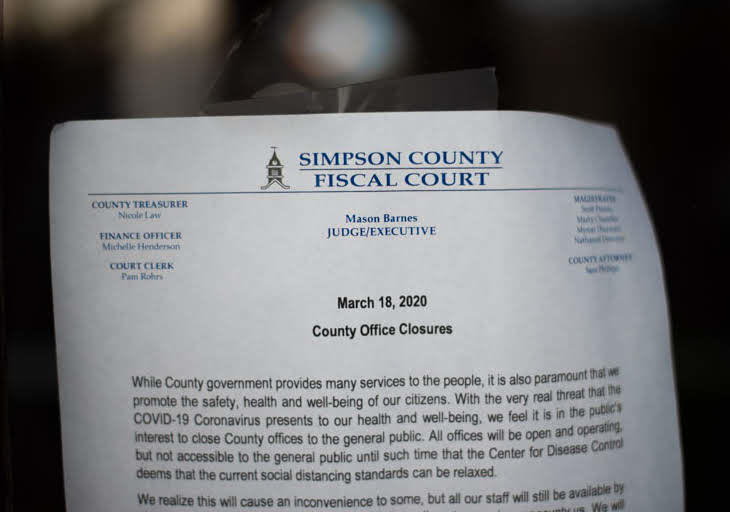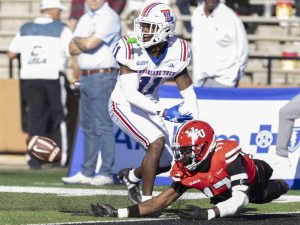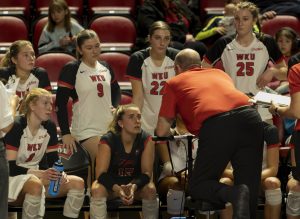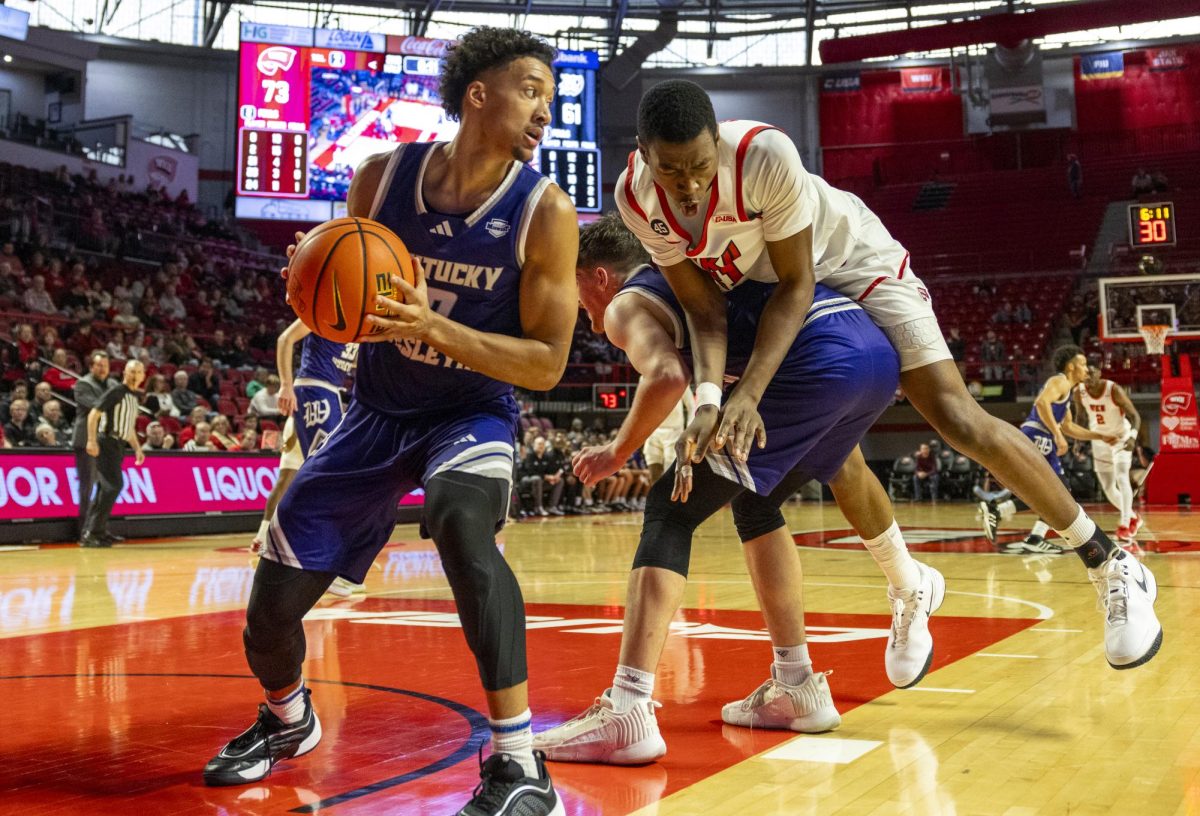‘Completely unprecedented’: How the coronavirus is impacting a small southern Kentucky town
April 9, 2020
The Judge/Executive of Simpson County never expected to deal with a crisis like the coronavirus.
The past few weeks, Mason Barnes has been attending teleconference meetings of Simpson County’s COVID-19 Coalition, which is made up of members of an emergency management team as well as local physicians and other members of the city and county government.
“I don’t think anyone could have anticipated anything like this,” Barnes said. “I knew running for Judge/Executive would there would be hard decisions to make and there would be some tough times, but I don’t think there’s any way to envision having to deal with a situation like what’s going on right now.”
The first case of the COVID-19 coronavirus was diagnosed in the Commonwealth of Kentucky on March 6. As of April 8, the number of cases was up to 1,346, with 73 deaths reported. Of those, 14 cases and one death are in Franklin, Kentucky.
Franklin is only home to about 8,000 people, yet it has seen 14 cases. Its neighbor Bowling Green, which is nearly six times its size, has seen 35.
“The main thing we’re doing is gathering information and knowledge from the medical community about what’s actually taking place and what the best practices are and the things that we need to do in that regard,” Barnes said.
To help curb the spread of the disease, Barnes signed an executive order on March 30 which would allow local law enforcement to disband large social gatherings — Gov. Andy Beshear issued a similar, statewide order on March 19.
“We actually gave the law enforcement the ability to tell a crowd ‘you can’t gather up here,’” Barnes said.
Even with social distancing being encouraged and public gatherings banned, some are asking for more measures.
“I’ve had an overwhelming positive response for every step that we’ve taken,” Barnes said. “In fact, I had people clamoring out to me — it wasn’t strict enough. ‘Do more, do more.’”
Additionally, the city of Franklin and Simpson County have enforced measures made by the governor, including closing government buildings, banks and non-essential businesses.
Bob Palmer, director of Emergency Services for Simpson County, said the first priority of the government is public safety.
“Our approach to managing the pandemic is to do our best to instill calmness in the community,” Palmer said. “As well as providing solid, reliable information.”
Each day, Palmer and Barnes host live video conferences in Franklin’s courthouse, where they discuss updates in the number of cases and measures being taken by the state government.
Additionally, Palmer said members of the emergency management office are helping at-risk members of the community by running errands for them. Palmer said residents can call and have someone run to the grocery store or pick up prescriptions.
Palmer also said his office communicates with Kentucky Emergency Management at least once a week.
“We get to communicate with the governor directly on occasion,” Palmer said. “Not as often as the county judges do, but I’m in constant daily contact.”
Palmer said the biggest way to fight the spread of the disease is by practicing social distancing.
“That is the tool that we’ve got to put in place that will stop the spread of the virus and help us flatten the curve,” Palmer said. “We’ve got to do it.”
‘Show the love of Christ’
When Beshear ordered all public gatherings, including churches, to close, Rev. John Whittaker of Franklin’s First Baptist Church was presented with new challenges for his congregation. To get around this hurdle, Whittaker began broadcasting his sermons via live stream.
“There was a little bit of hesitation, but mostly we were just content to find a way,” Whittaker said. “We feel like this is essential to life, and [Beshear’s] order was life sustaining.”
Initially, people were worried that service couldn’t take place since there was no congregation, but Whittaker said those proved to be “unfounded worries.”
“I think the biggest thing is that [the people] are the temple of the Holy Spirit,” Whittaker said. “God is using them to be the church.”
Whittaker encouraged his congregation to reach out to others during these times.
“They can still find a way to reach out and just show the love of Christ,” Whittaker said.
Roger Eldridge is a deacon at First Baptist. Eldridge also works as an actor in Nashville and said he has had to make large adjustments to his life because of the outbreak.
“It’s forcing us to slow down a little bit — read the Bible more, pray more,” Eldridge said.
Eldridge said he likes the idea of live streaming sermons on Sundays, even though there are no alternatives.
“It is the only option we have right now,” Eldridge said. “We would be morally irresponsible if we broke the recommendations and congregated people.”
Before he was an actor, Eldridge worked in Washington, D.C. as a Capitol Hill lobbyist for the dairy industry. Eldridge was in Washington during 9/11 and said fighting the coronavirus challenge is very different from fighting other enemies.
“We found out real quickly who the enemy was [on 9/11],” Eldridge said. “And with this, you don’t know where it is — it’s all over.”
‘Let’s plan a bear hunt’
Each day Quentin Lineberry walks about two miles with his wife Mandi and their kids, Cora, 4, and Ian, 7, — looking for bears.
The bear hunt doesn’t involve wild bears, but rather teddy bears which Franklin families have hidden in the windows of their homes.
Kentuckians are encouraged to go on walks around the neighborhood to stay physically — and mentally — healthy. The idea for the bears came from a children’s book, Lineberry said.
“It was great to get to walk around and have something to do with the kids besides just getting out and walking,” Lineberry said. “It’s been fun.”
There are almost 200 to be found. Allie Meador, a teacher at Franklin Simpson High School, created a map of each location, including insurance offices and homes.
“It’s also something to look forward to in the day,” Lineberry said. “Getting out of the house and doing something a little different.”
To celebrate Easter Sunday, some families are adding bunnies in their windows alongside the bears.
‘A team effort’
Katie Bunch is a senior at Franklin-Simpson High School. Bunch said she thinks the pandemic has affected her class more than anyone else.
To curb the spread of the coronavirus outbreak, Beshear recommended all public schools to close and move to non-traditional instruction, or NTI. The first week of Franklin’s NTI began on March 16.
“We’re all concerned about prom and graduation and we can’t go anywhere,” Bunch said. “It’s just a lot of things that we were looking forward to that we aren’t getting to and may not get to experience.”
Bunch is attending University of Kentucky in the fall and will study biology. Because of the pandemic, she may not get to see her friends before she graduates.
“We know it’s serious but we can’t help but be disappointed by not getting to spend the last few months together,” Bunch said.
Tim Schlosser, superintendent of Simpson County Schools, said educators in Kentucky are superheroes.
“When you completely and totally turn your entire system upside down and around and are able to deliver instruction to students in 72 hours, you’re a superhero in my opinion,” Schlosser said.
The chief academic officer, the district assessment coordinator, the special education director and the curriculum, instruction and assessment coordinators all met to plan what NTI would look like, Schlosser said. The meeting was held before Beshear made an official recommendation that schools close.
“It really was a team effort,” Schlosser said. “We put together the first five days of NTI work without burdening the teachers because we didn’t know for sure if it was going to happen, and we didn’t want them to be worried about that and try to teach school as well.”
Leah Wood is a curriculum, instruction and assessment coordinator for Franklin Simpson High School. Her job has been to create curricula for teachers to follow during NTI days. Wood said work for the first NTI days was being put together 24 hours before the district’s closure
“The difficulty with that was we were trying to come up with an online option and a paper option depending on what the kids had available to them,” Wood said.
So far, Wood said NTI has gone “very well.”
“I’m sure there’s hiccups, but everyone I’ve talked to — it’s going really well,” Wood said.
For some students, access to a computer is not available. Because of this, Simpson County Schools’ Technology department has allowed students to sign out Dell Chromebooks to use for their classes.
Scot Perdue, director of technology for SCS, said around 250 Chromebooks have been checked out from the district. Perdue said there has been a “steady stream” of students coming to get the computers.
Perdue said teachers have responded well to the shift to NTI and are finding ways to connect with their students.
“It’s been very good,” Perdue said. “We are having teachers doing more Google Hangout and doing things like that to unite with the kids.”
The district’s technology department has even built a page on the district’s website specifically to access NTI materials.
Currently, SCS will continue with NTI until end-of-day May 1, per Beshear’s recommendations. The date is open to change though, because no one knows how long the pandemic will last.
“I think we just kind of have to wait and see how this goes in these next few weeks,” Schlosser said.
‘People gotta eat’
Though many businesses have closed their doors, Corey England is still going to work.
England hauls between 75 and 80 tons of fertilizer per day for Nutrien Ag Solutions, a crop services company. The Department of Homeland Security has designated food and agriculture to be essential industries during the coronavirus pandemic.
England said he is not around many big groups and feels safe doing his job. He said people are depending on agriculture.
“We can’t just completely stop,” England said. “People gotta eat.”
Beshear signed an executive order on March 30 prohibiting out-of-state travel for non-essential industries. Agriculture has been deemed an essential industry by the government.
“We’re taking all the precautions we’re supposed to,” England said.
Even with the precautions that are in place, England said work for him is operating as it usually does.
“[Farmers] aren’t panicking and buying up all this stuff thinking it’s going to run out,” England said. “We’ve got to put a crop out. We’ve got to keep the country fed.”
‘For Franklin — it’s a tradition’
As Kentucky prepares to see a surge in its number of cases, stores sit closed, restaurants are vacant and daily life has moved to a standstill. Even so, residents of Franklin are finding different ways to socialize.
In addition to the bear hunts, members of the community are participating in “cruise nights” around town. Families load up in their cars and drive around downtown Franklin, honking their horns and yelling at their friends.
Amy Ellis is a WKU alumna and executive director of Franklin-Simpson Renaissance, a nonprofit that leads revitalization efforts in the downtown area. Ellis said the cruise route is similar to the routes she and her friends would take when she was in high school: circle the square, drive about a mile north on main street, turn around, and come back.
“That was the cruise pattern for our generation in the 1980s,” Ellis said. “It was just fun — you can ride around, you could see who is who and who was hanging out. It was an innocent, fun way to hang out with your friends and actively be doing something.”
While the cruise nights aren’t a Renaissance creation, Ellis said she enjoys seeing people out doing it.
“It’s a tradition,” Ellis said. “It’s something that transcends all generations in Franklin.”
News reporter Jack Dobbs can be reached at [email protected]. Follow him on Twitter at @jackrdobbs.












